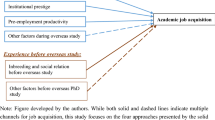Abstract
A growing number of Western-educated management PhD graduates are starting their academic career in Chinese business schools. While opportunities are abundant for these returnees, they also face the choice between developing internationally transferable assets and building locally embedded competences. Some possible solutions are discussed, at both personal and institutional levels.
Similar content being viewed by others
Notes
In this paper, “Chinese business schools” refer to local schools in mainland China, not including Cheung Kong Graduate School of Business (CKGSB) and China Europe International Business Schools (CEIBS), which are fully or jointly foreign owned.
Returnees are nick-named “sea turtles” in the popular Chinese language, in contrast to “land turtles” for locals. A word of caution, though. While the term “sea turtle” is humorous, to call somebody a “land turtle” could be interpreted as insulting.
To this day, Guanghua is still the only Chinese school that has explicitly spelled out tenure terms. The timeframe for getting tenure there is a bit longer than in a typical North American institution: It takes at least eight years, as tenure comes only with full professorship.
Not until the early 1980s, since the end of Cultural Revolution, did China have the first university graduates, some of whom then started to go abroad for post-graduate study.
In the Chinese educational system, only a small fraction of full professors are allowed to supervise doctoral students. These are designated, by the Ministry of Education, as “doctoral supervisory professors.” Recently, however, Peking University has been allowed to extend this designation to its associate and assistant professors.
Although the monetary value of the package was still substantially lower than the North American standards, it was at a level unimaginable to an average university professor in China.
The point has been well made by Vermeulen (2007): You do not have to have been a mountain gorilla to understand them; but to truly understand the subject, you have to go to the mountains and smell the beast.
Ramaswamy (2007) proposed to help Asian scholars integrate into the global research community through faculty exchanges. While I believe overseas exchanges have been a good way of internationalizing China’s MBA programs, they haven’t produced much research output—despite the fact that a high proportion of faculty members in top Chinese business schools have gone through some kind of exchange program. From my personal observation, the existence of returnees seems more effective in creating an internal research environment.
A current constraint on these research-oriented PhDs is again the tradition of “inside careers”. While Guanghua has made it a policy that the school will no longer hire its own graduates, most other schools have not followed suit, causing difficulty for placing these graduates.
Such a dimension was used by Dawar and Frost (1999), when discussing strategic choices of emerging market firms.
References
Buchholtz, A. K., Ribbens, B. A., & Houle, I. T. 2003. The role of human capital in postacquisition CEO departure. Academy of Management Journal, 46(4): 506–514.
Chang, S. & Xu, D. 2008. Spillovers and competition among foreign and local firms in China. Strategic Management Journal, in press. DOI 10.1002/smj.674.
Dawar, N., & Frost, T. 1999. Competing with giants: Survival strategies for local companies in emerging markets. Harvard Business Review, 77(2): 119–129.
Meyer, K. E. 2006. Asian management research needs more self-confidence. Asia Pacific Journal of Management, 23: 119–137.
Meyer, K. E. 2007. Asian contexts and the search for general theory in management research: A rejoinder. Asia Pacific Journal of Management, 24: 527–534.
Peng, M. W. 2005. From China strategy to global strategy. Asia Pacific Journal of Management, 22: 123–141.
Pfeffer, J. 1993. Barriers to the advance of organizational science: Paradigm development as a dependent variable. Academy of Management Review, 18: 599–620.
Pleggenkuhle-Miles, E. G., Aroul, R. R., Sun, S. L., & Su, Y. S. 2007. The adolescence of Asia management research: APJM, 1997–2006. Asia Pacific Journal of Management, 24: 467–489.
Ramaswamy, K. 2007. Asian management research needs broader initiatives and focused incentives. Asia Pacific Journal of Management, 24: 519–525.
Tan, J. 2006. On the positioning of the management field in China. Management World (in Chinese), February: 71–79.
Tan, J. 2007. On the development of the management field in China. Management World (in Chinese), January: 81–91.
Tsui, A. S. 2004. Contributing to global management knowledge: A case for high quality indigenous research. Asia Pacific Journal of Management, 21: 491–513.
Vermeulen, F. 2007. I shall not remain insignificant: Adding a second loop to matter more. Academy of Management Journal, 50(4): 754–761.
Xu, D. & Zhou, C. 2004. Strategic management research in China: An assessment. Management World (in Chinese), May: 76–87 .
Author information
Authors and Affiliations
Corresponding author
Additional information
This paper is based on a talk at a workshop for young Chinese scholars during the 2007 Academy of Management annual meetings in Philadelphia. I thank Ming-Jer Chen and Tom Tao for organizing this event, and Mike Peng (Editor-in-Chief) for encouraging me to publish these thoughts and contributing his ideas.
Rights and permissions
About this article
Cite this article
Xu, D. Opportunities and challenges for academic returnees in China. Asia Pac J Manag 26, 27–35 (2009). https://doi.org/10.1007/s10490-007-9075-y
Published:
Issue Date:
DOI: https://doi.org/10.1007/s10490-007-9075-y




